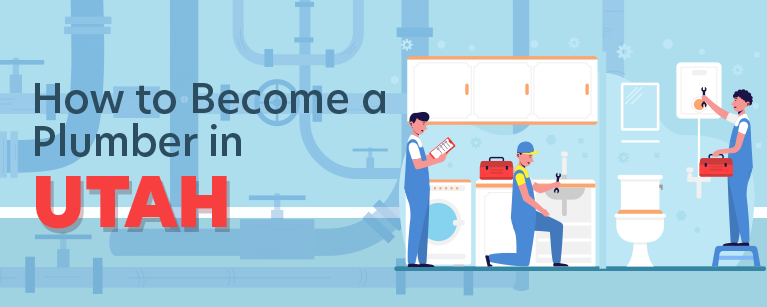
In Utah, where the stunning landscapes seamlessly blend with a rich cultural tapestry, the plumbing infrastructure plays a crucial role in
sustaining the harmony of our residences, businesses, and neighborhoods.
At the center of this essential network are the adept plumbers, working diligently to guarantee the ease and well-being of our contemporary
lifestyle.
Embarking on a career in plumbing within the Beehive State goes beyond mere pipe installations or leak repairs; it’s a gratifying path that
promises both personal fulfillment and a meaningful contribution to society.
In this article, we’ll share with you everything you need to know on how to become a plumber in Utah.
Table of Contents
How to Become a Plumber in Utah – Step by Step
If you are 18 or older and have a High School Diploma or the GED equivalent you can start your plumbing career in Utah.
Before you can apply for any of the licenses the state issues, you must complete the necessary training.
You can obtain the training requirements by:
- enrolling in a Division-approved apprenticeship program
- working directly under the supervision of an already licensed professional, who will also be your mentor
- enrolling in a technical or community college/vocational school/plumbing-specific program
Since Utah requires both on-the-job training and formal class education you might need to combine two of these methods.
It is important to note that you must register with the Utah Division of Professional Licensing as soon as you begin your training.
The state of Utah issues the following plumbing licenses:
- Apprentice Plumber (not an actual license, plumber trainee registration)
- Journeyman Plumber
- Residential Journeyman Plumber
- Master Plumber
- Residential Master Plumber
Journeyman Plumber/Residential Journeyman Plumber
The licensing process for Journeyman and Residential Journeyman plumbers is the same.
The only difference between these two is in the experience requirements.
Journeyman Plumber License
Journeyman Plumber License applicants must meet one of the following requirements:
- have completed 4 years full-time as a registered apprentice while enrolled in an approved training program that includes at least 576 hours of classroom education
- have completed 8 years full-time as a registered apprentice outside an approved training program
Residential Journeyman Plumber License
Residential Journeyman Plumber License applicants must meet one of the following requirements:
- have completed 3 years full-time as a registered apprentice while enrolled in an approved training program that includes at least 432 hours of classroom education
- have completed 6 years full-time as a registered apprentice outside an approved training program
Applicants for both licenses must submit an application form and pay the $116 application fee to the Utah DOPL.
There is also an exam fee that is $168 total, $68 for the written portion of the exam, and $100 for the practical portion of the exam.
Written exam portion
The written exam is an open-book exam that consists of 120 questions and has a 4-hour time limit.
Topics on the exam include:
- Backflow prevention
- Drainage waste and vents
- Fire sprinkler systems
- Fuel gas
- General knowledge and regulations
- Hydronics
- Indirect waste*
- Isometric analysis
- Plumbing fixtures
- Roof drains and storm drainage systems
- Septic and sewer
- Specialty plumbing, interceptors, and traps
- Water supply systems
There are slight differences between the Journeyman and Residential written exams.
Practical Exam portion
You need a score of 70% or higher to pass the exam.
For the practical portion of the exam, candidates are supposed to bring their tools and safety glasses.
The practical exam is divided into 2 portions with 74 points total, and there is a 2.5-hour time limit.
- Plastic Assembly: 37 Points
- Copper Assembly: 37 Points
You will receive your written exam results immediately after completing the exam, and your practical exam score within 15 days of the exam.
There is a pass/fail system for the practical exam.
The individual will have to retake the full exam if they fail any of the projects.
You won’t be able to retake the exam for 30 days after failing it.
You will have to wait 120 days to retake the exam if you fail more than three times.
Master Plumber/Residential Master Plumber
The licensing process for Master and Master Residential plumbers is the same.
The only difference between these two is in the experience requirements.
Master Plumber License applicants must meet one of the following requirements:
- Have been a licensed journeyman for at least 2 years with a minimum of 2 years of supervisory experience
- Have received an associate degree in applied science and have a minimum of 1-year supervisory experience as a licensed journeyman plumber
Master Residential plumber license applicants can only apply if they have been a licensed residential journeyman for at least 2 years with a minimum of 2 years of supervisory experience.
Applicants for both licenses must submit an application form and pay the $116 application fee to the Utah DOPL.
There is also an exam fee that is $168 total, $68 for the written portion of the exam, and $100 for the practical portion of the exam.
The written exam is an open-book exam that consists of 120 questions and has a 4-hour time limit.
The exam includes topics such as:
- Business Management
- Project Supervision
- Trade Knowledge
The practical portion of the exam consists of 2 projects with 74 points total and a 2.5-hour time limit.
- Plastic Assembly: 37 Points
- Copper Assembly: 37 Points
The grading, passing, and retaking of the exam processes are the same as for Journeyman Licenses.
Plumbing Schools in Utah
Utah offers quality apprenticeship programs and schooling options to ensure the best education and training for its aspiring plumbers
Salt Lake Community College
The School of Technical & Professional Specialties within Salt Lake Community College offers an apprenticeship program.
Their program provides formal classroom education for aspiring plumbers.
Depending on the curriculum, classes are held during the days and evenings including Saturday if necessary.
This course does not offer on-the-job training, you will be responsible for finding your training institution or tutor.
To learn more about their program and how to apply visit their website.
| School Name | Address |
|---|---|
| Salt Lake Community College | 4600 S Redwood Rd, Salt Lake City, UT 84123, United States |
Salary
Plumbers in Utah are greatly paid for their hard work to keep the plumbing systems running properly throughout the state.
The annual wage can vary anywhere from $45,060 to $76,436.
The annual average wage is currently estimated at $60,688.
The highest annual average salaries are $64234 in the city of St. George.
Annual Salary Range:| Location | Avg. Annual Salary |
|---|---|
| St. George | $64,234 |
| Salt Lake City | $61,528 |
| Sandy | $61,361 |
| West Jordan | $61,306 |
| South Jordan | $61,250 |
| Ogden | $59,417 |
| Layton | $59,195 |
| Provo | $58,974 |
| Orem | $58,974 |
| Logan | $58,583 |
Regional Salary in Utah
| Region | Employed | Avg. Annual Salary | Avg. Hourly Pay | Top 10% Annual Salary | Bottom 10% Annual Salary |
|---|---|---|---|---|---|
| Logan, UT-ID | 150 | $51,100 | $24.57 | $70,930 | $34,970 |
| Ogden-Clearfield, UT | 1,200 | $57,720 | $27.75 | $78,950 | $34,330 |
| Provo-Orem, UT | 960 | $57,280 | $27.54 | $81,280 | $38,320 |
| St. George, UT | 440 | $51,550 | $24.78 | $72,340 | $30,040 |
| Salt Lake City, UT | 2,710 | $63,480 | $30.52 | $84,090 | $39,430 |
* Employment conditions in your area may vary.
Frequently Asked Questions
When should I renew my Utah plumbing license?
All plumbing licenses in Utah expire on November 30th of every-numbered year, so you should have them renewed by
then.
The next renewals should be completed by November 30th, 2024.
How much does it cost to renew my plumbing license in Utah?
All plumbing license renewal fees are $69 in Utah.
Who is issuing the plumbing exams and licenses in Utah?
The Utah Department of Commerce Division of Occupational and Professional Licensing is responsible for all plumbing exams and licenses in Utah, alongside Prov Inc.
Plumber Info by State
- Alabama
- Alaska
- Arizona
- Arkansas
- California
- Colorado
- Connecticut
- Delaware
- Florida
- Georgia
- Hawaii
- Idaho
- Illinois
- Indiana
- Iowa
- Kansas
- Kentucky
- Louisiana
- Maine
- Maryland
- Massachusetts
- Michigan
- Minnesota
- Mississippi
- Missouri
- Montana
- Nebraska
- Nevada
- New Hampshire
- New Jersey
- New Mexico
- New York
- North Carolina
- North Dakota
- Ohio
- Oklahoma
- Oregon
- Pennsylvania
- Rhode Island
- South Carolina
- South Dakota
- Tennessee
- Texas
- Utah
- Vermont
- Virginia
- Washington
- West Virginia
- Wisconsin
- Wyoming









